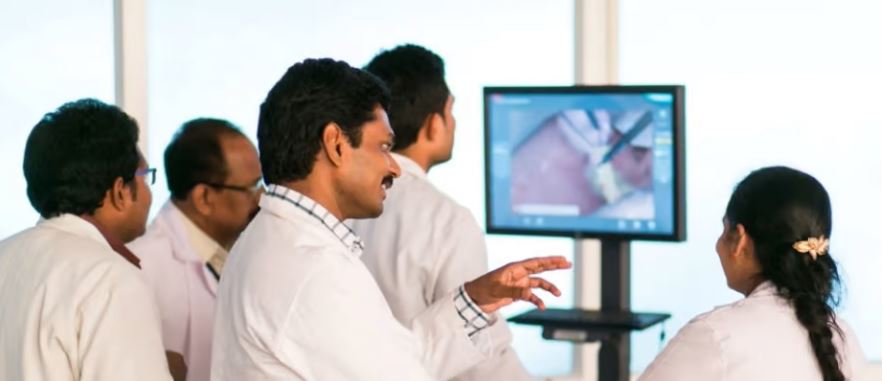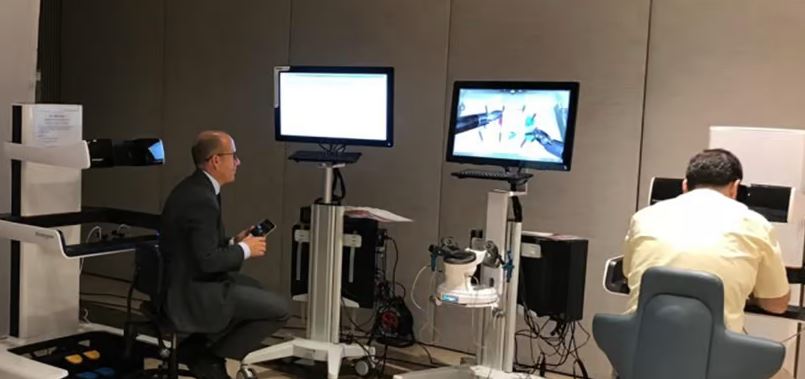Download PDF
Quixy schools Presidency Group on improving invoice processing time by 30%
Technology Category
- Analytics & Modeling - Real Time Analytics
- Application Infrastructure & Middleware - Data Exchange & Integration
- Functional Applications - Enterprise Resource Planning Systems (ERP)
Applicable Industries
- Education
Applicable Functions
- Business Operation
- Procurement
Use Cases
- Process Control & Optimization
- Digital Thread
- Remote Collaboration
Services
- System Integration
- Software Design & Engineering Services
The Challenge
Running an educational institution requires seamless collaboration between school or college management members, administrative staff, teachers, and service providers. The service providers include companies offering educational services, independent consultants, publication companies, transporters, caterers, event companies, housekeeping, and consultants to name a few. One of the main problems the management was facing was manual processing of invoices from the service providers. These were being physically delivered, mailed through post, and also coming over email. It was becoming hard to track these in one place. Each invoice needed to be verified by the administrative staff and then approved based on the value of the invoice. Due to the unavailability of the respective approving authorities, payments were getting delayed. Calls from service providers to check the status of their invoices were bombarding the administrative staff. The school needed an immediate solution to automate the process and they chose Quixy after evaluating several options.
About The Customer
Presidency Group is a well-established educational institution that operates multiple schools and colleges. The group is known for its commitment to providing quality education and fostering a collaborative environment among its management, administrative staff, teachers, and various service providers. These service providers include companies offering educational services, independent consultants, publication companies, transporters, caterers, event companies, housekeeping, and consultants. The group faced significant challenges in managing the manual processing of invoices from these diverse service providers, leading to delays and inefficiencies. To address these issues, the Presidency Group sought a solution to automate their invoicing process and improve overall operational efficiency.
The Solution
Quixy appraised the requirement and in just a few days automated the invoicing process. The service was immediately rolled out for use by the service providers. It made a sea change in the way transactions were carried out with service providers conveniently uploading their invoices with supporting documents. The invoices were verified online by the school administration and approvals were given promptly via smartphones. The approved invoices were then sent to the accounts department for processing the payment. Notifications, reminders, and escalations configured at each step of the workflow helped to speed up the whole process.
Operational Impact
Quantitative Benefit
Related Case Studies.

Case Study
IoT platform Enables Safety Solutions for U.S. School Districts
Designed to alert drivers when schoolchildren are present, especially in low-visibility conditions, school-zone flasher signals are typically updated manually at each school. The switching is based on the school calendar and manually changed when an unexpected early dismissal occurs, as in the case of a weather-event altering the normal schedule. The process to reprogram the flashers requires a significant effort by school district personnel to implement due to the large number of warning flashers installed across an entire school district.

Case Study
Revolutionizing Medical Training in India: GSL Smart Lab and the LAP Mentor
The GSL SMART Lab, a collective effort of the GSL College of Medicine and the GSL College of Nursing and Health Science, was facing a challenge in providing superior training to healthcare professionals. As clinical medicine was becoming more focused on patient safety and quality of care, the need for medical simulation to bridge the educational gap between the classroom and the clinical environment was becoming increasingly apparent. Dr. Sandeep Ganni, the director of the GSL SMART Lab, envisioned a world-class surgical and medical training center where physicians and healthcare professionals could learn skills through simulation training. He was looking for different simulators for different specialties to provide both basic and advanced simulation training. For laparoscopic surgery, he was interested in a high fidelity simulator that could provide basic surgical and suturing skills training for international accreditation as well as specific hands-on training in complex laparoscopic procedures for practicing physicians in India.

Case Study
Implementing Robotic Surgery Training Simulator for Enhanced Surgical Proficiency
Fundacio Puigvert, a leading European medical center specializing in Urology, Nephrology, and Andrology, faced a significant challenge in training its surgical residents. The institution recognized the need for a more standardized and comprehensive training curriculum, particularly in the area of robotic surgery. The challenge was underscored by two independent studies showing that less than 5% of residents in Italian and German residency programs could perform major or complex procedures by the end of their residency. The institution sought to establish a virtual reality simulation lab that would include endourological, laparoscopic, and robotic platforms. However, they needed a simulator that could replicate both the hardware and software of the robotic Da Vinci console used in the operating room, without being connected to the actual physical console. They also required a system that could provide both basic and advanced simulation training, and a metrics system to assess the proficiency of the trainees before they performed surgical procedures in the operating theater.

Case Study
Edinburgh Napier University streamlines long-distance learning with Cisco WebEX
• Geographically dispersed campus made in-person meetings costly and inconvenient.• Distance-learning programs in Malaysia, India, and China required dependable, user-friendly online tools to maximize interaction in collaborative workspaces.• Virtual learning environment required a separate sign-in process, resulting in a significant administrative burden for IT staff and limited adoption of collaboration technology.

Case Study
8x increased productivity with VKS
Before VKS, a teacher would spend a lot of time showing a group of 22 students how to build a set of stairs within a semester of 120 hours. Along with not leaving the teacher much time to provide one-on-one support for each student to properly learn carpentry, it also left a considerable amount of room for error. Key information would be misinterpreted or lost as the class was taught in the typical show-and-tell way.

Case Study
Scalable IoT Empowering GreenFlex's Sustainable Growth
GreenFlex, a company that supports sustainable development, decarbonization, and energy efficiency, faced several challenges in its quest to expand its business. The company needed to deploy a robust and sustainable IoT technology to support its growth. It was crucial for them to monitor and control devices at customer sites in a safe and reliable manner. They also needed to integrate devices across a range of communication protocols and gather and act on data to meet efficiency targets. GreenFlex had previously built IoT capabilities into its digital platform, GreenFlexIQ, to monitor and manage customer sites remotely. However, they soon realized that they needed a new platform to support their ambitions. They needed a platform that could scale to connect more devices for production management and make it easier for the operations team to manage devices in the field.




